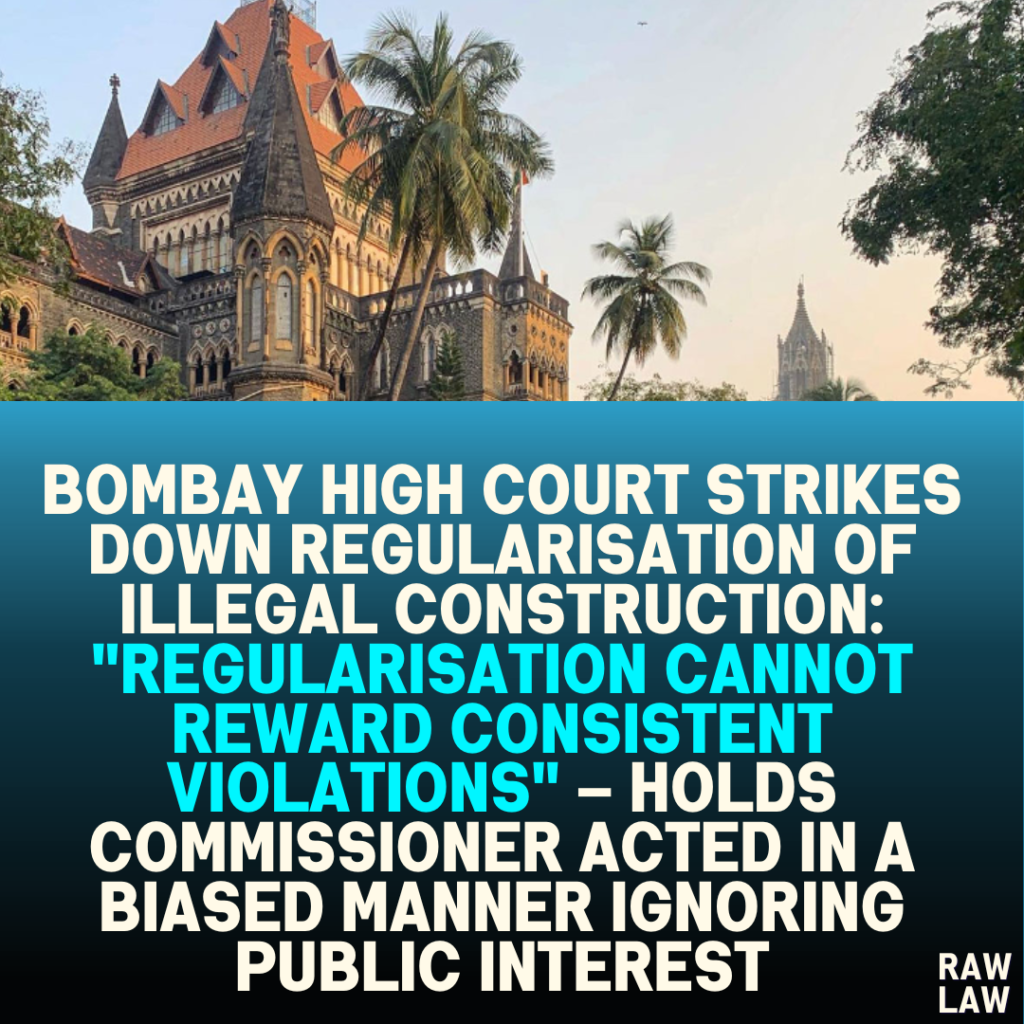Court’s Decision:
The Bombay High Court quashed the impugned regularisation order dated 05 February 2005, holding that the Commissioner of the Thane Municipal Corporation (TMC) had acted in an arbitrary manner and abused his powers. The court found that the construction of a slab over a public Nallah (drain) by a developer was patently illegal and defied multiple stop-work orders issued by the TMC. The court observed that the Commissioner’s reliance on provisions of the Maharashtra Regional and Town Planning Act (MRTP Act), the Maharashtra Municipal Corporations Act (MMC Act), and the Development Control Regulations (DCR) of TMC was entirely misplaced and unsupported by facts.
Facts:
- The Petitioners, who are residents of Tarangan Housing Complex, filed the writ petition challenging the regularisation of an unauthorised construction carried out by the third respondent (a builder/developer) on a municipal Nallah.
- The third respondent initially constructed Tarangan Housing Complex, which had direct access to the service road. Subsequently, the third respondent built a shopping mall and multiplex theatre, blocking the direct access.
- To divert focus from this obstruction, the builder covered a public drain/Nallah with an RCC slab, constructing an alternative access for the complex.
- Despite TMC issuing stop-work notices and a demolition order for the illegal construction, the builder completed the slab covering and applied for regularisation, which was granted by the Commissioner of TMC.
Issues:
- Whether the Commissioner of TMC had the authority to regularise a patently unauthorised construction.
- Whether the impugned regularisation order violated the provisions of the MRTP Act and the MMC Act.
- Whether the TMC’s volte-face, supporting the regularisation order after having issued demolition orders, was justified.
Petitioner’s Arguments:
- The Petitioners contended that the impugned regularisation order was arbitrary and ultra vires, violating the MRTP Act and MMC Act.
- The order was based on the false premise that the regularisation was necessary for providing access to the housing complex, when in fact, the original access was blocked by the builder’s own construction.
- The Petitioners argued that the TMC’s actions demonstrated legal malafides, as the order ignored prior assertions that the construction was patently illegal and obstructed the flow of water in the Nallah.
Respondent’s Arguments:
- The TMC, through its counsel, defended the regularisation order, arguing that it was permissible under Sections 44, 45, and 53 of the MRTP Act, and Section 227 of the MMC Act.
- The builder argued that the RCC slab and columns were necessary to maintain access and claimed that the structure did not obstruct water flow in the Nallah.
Analysis of the Law:
- The court examined the provisions of Sections 44, 45, and 53 of the MRTP Act and Section 227 of the MMC Act, and found no basis for the impugned order.
- It observed that the subject plot was not landlocked, making Regulation 47(7) of the DCR inapplicable. The court highlighted that the builder had no right to claim regularisation after defying multiple stop-work orders.
Precedent Analysis:
- The court referred to the Supreme Court’s judgment in Friends Colony Development Committee v. State of Orissa, which emphasised that regularisation cannot be a tool to reward consistent violations of sanctioned building plans.
- The court also cited Sakib Ayub Khan v. Kalyan Dombivli Municipal Corporation, where it was held that regularisation is impermissible for constructions without permissions and legal backing.
Court’s Reasoning:
- The court noted that the TMC, in its previous affidavits, vehemently opposed the construction, calling it illegal and obstructive. However, the impugned regularisation order did not address these points and was premised on misleading interpretations of the law.
- The court observed that the Commissioner acted in a biased manner, seemingly to favour the builder, ignoring public interest and the authority’s own previous positions.
Conclusion:
The court struck down the impugned regularisation order dated 05 February 2005, holding that it was a product of complete non-application of mind and contrary to legal principles. The court ruled that such misuse of power cannot be condoned, especially when it concerns public properties like municipal drains.
Implications:
The ruling reaffirms the principle that illegal constructions cannot be legitimised through arbitrary use of municipal powers. The judgment sends a strong message against the misuse of regularisation provisions to benefit private developers at the cost of public resources.




Pingback: Delhi High Court Holds Oral Lease Agreement Valid as 'Commercial Dispute' Based on Tangible Actions and Property's Commercial Use for Banking Business - Raw Law